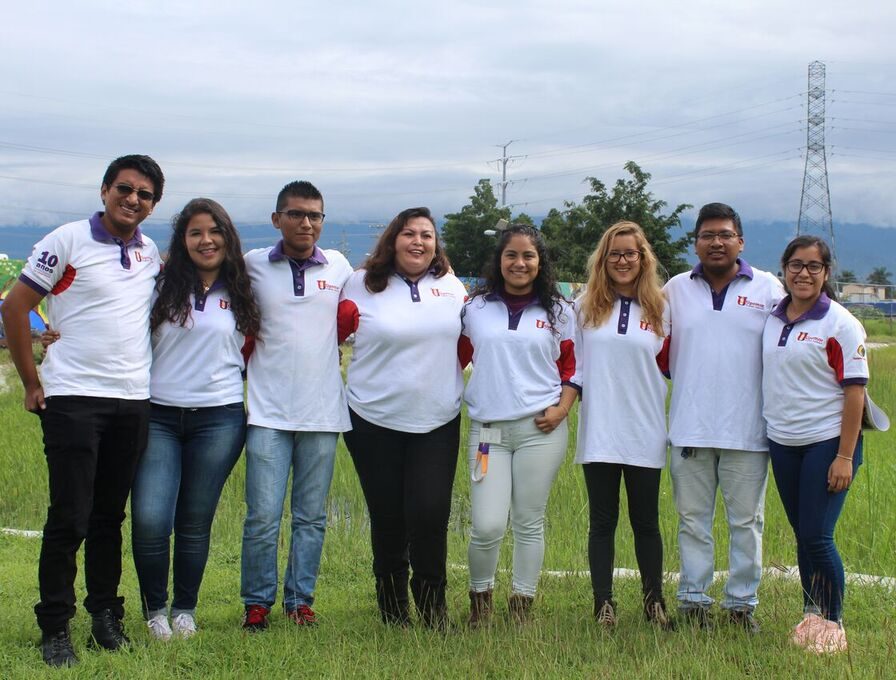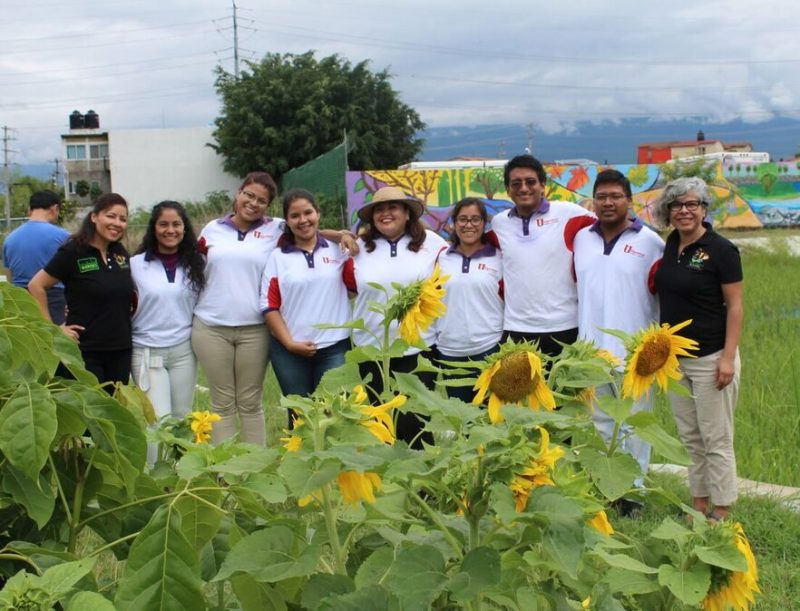Por Gisela Frías (Dawson College)
English Follows
La Universidad Politécnica del Estado de Morelos, líder ambiental y modelo a seguir en el manejo sustentable de sus instalaciones, asume un nuevo reto, redefinir su concepto de sustentabilidad a uno que incluye la valoración de la biodiversidad y fomenta el trabajo colaborativo para ganar conciencia en su comunidad y espacios por la paz.
Ganadora de un número de premios por su manejo ambiental, hoy la UPEMOR asume el reto de expandir su visión de lo sustentable para incluir objetivos como la valoración y fomento de la biodiversidad en su plantel y fomentar la colaboración entre estudiantes, profesores y personal para promover el bienestar para todos y ambientes de paz. Estos son los objetivos detrás de uno de sus últimos proyectos, el “Jardín Acuático por la Paz”, liderado por el Centro de Capacitación Ambiental (CECAM).

La idea de un Jardín Acuático por la paz nació con el desarrollo de la relación entre la UPEMOR y el Dawson College en Montreal. Dawson, después de un desafortunado acto de violencia, respondió a la tragedia invitando a la comunidad educativa a colaborar en sembrar un jardín, un Jardín Ecológico por la Paz. El Jardín Acuático por la Paz de la UPEMOR es un jardín hermano. La primera etapa del proyecto consistió en plantar árboles y construir jardineras alrededor de una laguna de regulación que se encuentra en sus terrenos. La reforestación y las jardineras tienen como objetivo aumentar la biodiversidad en el área alrededor de la laguna. Solo unos meses después las plantas ya están atrayendo especies de pájaros, mariposas y otra fauna a este espacio que geográficamente es parte de la selva baja caducifolia y está próximo al área protegida El Texcal. El espacio ya es un hábitat invitador para la flora y fauna endémica del lugar. Otro componente importante de esta primera etapa fue el pintar un mural al costado de la laguna de regulación. El mural es una representación de la biodiversidad endémica de la región (y en Canadá), pero también tiene símbolos que representan la colaboración entre México y Canadá y el profundo deseo de trabajar porque estos planteles sean espacios de paz.

Cabe destacar que la manera en que este proyecto se ha desarrollado cumple con importantes objetivos de sustentabilidad que van más allá de la definición técnica del manejo ambiental. La construcción de las jardineras tanto como el diseño y la pintura del mural fueron un esfuerzo colectivo dirigido a unir, concientizar y movilizar a la comunidad educativa por el bienestar colectivo y el entorno natural. Estudiantes de diferentes carreras en ingeniería participaron en estas actividades. El diseño y realización del mural en si fue un proceso de colaboración entre la comunidad educativa y abierto a externos. Incluso estudiantes de Dawson College participaron en su ejecución. Participación en este proyecto ha sido una experiencia transformadora. Sus participantes nos cuentan que este proyecto fue una experiencia que les permitió mayor concientización de la importancia de su participación en acciones ambientales, del valor intrínseco de la naturaleza y de cómo su propio bienestar está ligado a esta.

La intención de este proyecto va a más allá de fomentar la biodiversidad, reconoce que se puede encontrar paz en la naturaleza. El proyecto está en vías de construcción. Aún faltan etapas, una tan importante como el conseguir impermeabilizar la laguna de contención para que ésta contenga agua durante todo el año y no solo durante la temporada de lluvia. La visión es de un espacio construido por y para la comunidad educativa. Un espacio donde los estudiantes puedan convivir bajo la sombra de un árbol, admirar y valorar la biodiversidad. Un espacio dentro del plantel fuera del ambiente de estrés que se vive entre trabajos y exámenes en las aulas. Este proyecto reconoce que la naturaleza cura, la naturaleza calma, la naturaleza restaura, la naturaleza conecta.
La UPEMOR, una institución de educación superior, de enseñanza y formación mayormente técnica, nos está dando una lección no solo en biología si no también en humanidad. Nos enseñan que una definición integral de la gestión ambiental incluye no solo tecnología, sino también cultura ambiental, arte, fomento de la convivencia y la paz en nuestros planteles educativos, que los espacios verdes, de tranquilidad, de reflexión son nuestro derecho.
Blog basado en entrevista con Valeria Dávila y Sergio García (responsables del proyecto), miembros del CECAM y estudiantes que participaron en diferentes actividades vinculadas con este proyecto.
A challenge made with effort, will, purpose, courage and trust as its main ingredients
By Gisela Frías (Dawson College)
Translation by Abril Obregon
The Universidad Politécnica del Estado de Morelos, an environmental leader and role model to follow on the sustainable management of their facilities, assumes a new challenge, to redefine its concept of sustainability to one that includes valuing biodiversity and encouraging collective work to sensitize their community and the creation of spaces for peace.
Winner of a number of prizes for its environmental management, today the UPEMOR assumes the challenge to expand its vision of sustainability to include objectives such as valuing and promoting biodiversity in its campus and encouraging collaboration between students, teachers and staff to promote environments of peace and well-being for all. These are the objectives behind one of their last projects, the Aquatic Peace Garden, led by its Environmental Training Center (CECAM).

The idea of an Aquatic Peace Garden was born with the development of the relationship between the UPEMOR and Dawson College. Dawson, after an unfortunate act of violence, responded to the tragedy with an invitation to its educational community to collaborate in planting a garden, an Ecologic Peace Garden. The UPEMOR’s Aquatic Peace Garden is its sister garden. The first step of the project consisted in planting trees and building planters around a regulation lagoon that is situated in their grounds. The reforestation and the planters had as an objective to increase the biodiversity in the area around the lagoon. Just a few months after, the plants are already attracting species of birds, butterflies and other fauna to this space that is geographically part of the lower deciduous jungle and is near the protected area “El Texcal”. The space is already a welcoming habitat for the endemic flora and fauna of the area. Another component that is also important in this first step was to paint a mural along the side of the regulation lagoon. The mural is a representation of the endemic biodiversity of the region (and of Canada too), but also has symbols that represent the collaboration between Mexico and Canada and the profound wish to work for the generation of spaces for peace in these campuses.

It is important to highlight that the way this project has been developed complies with important sustainability objectives that go beyond the technical definition of environmental management. The construction of the planters, the design and the painting on the mural have been a collective effort aimed to unite, sensitize and mobilize the educational community for the well being of all and the natural surroundings. Students from different engineering programs participated in these activities. The design and realization of the mural was itself, a collaboration process between the educational community and open to outsiders. Even students of Dawson College participated in its execution. Participation in this project has been a transforming experience. Its participants tell us that this project was an experience that allowed them to become sensitized about the importance of their participation in environmental actions, of the intrinsic value of nature and of how our own well-being is linked to it.

The intention of this project goes further than encouraging biodiversity. It recognizes that one can find peace in nature. The project is under construction. There are still important stages to work on, such as placing an insulating membrane in the lagoon so that it contains water throughout the year and not only during the rainy season. The vision is of a space built by and for the educational community. A space where students can spend time together under the shade of a tree, where they can admire and value biodiversity, a space within the campus, outside of the stressful classroom environment full of assignments and exams. This project recognizes that nature heals, nature relaxes, nature restores and nature connects.
The UPEMOR, a higher education institution, of mostly technical learning and formation, is giving us a lesson not only about biology but also on humanity. They teach us that an integral definition of environmental management not only includes technology but also environmental culture, art, encouragement of coexistence, and peace in our sustainable campuses, that green spaces of tranquility and reflection are our right.
Blog based on an interview with Valeria Dávila and Sergio García (responsible for the project), members of CECAM and students who participated in different activities related to this project.



